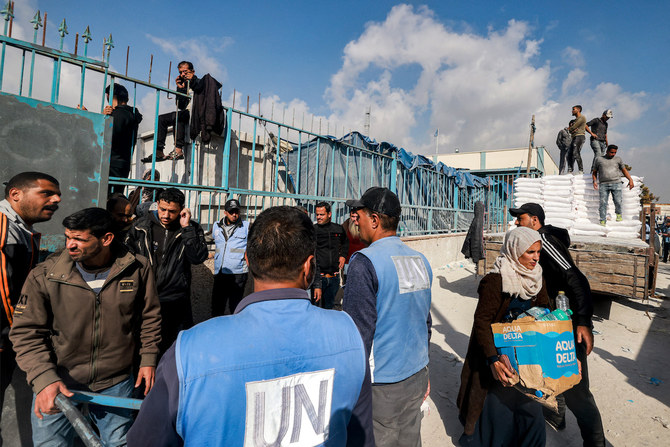LONDON: All but two of the 152 UN workers killed in Gaza were “off-duty” at the time of their deaths, according to data seen by The Telegraph.
The statistics reveal the extent of Israel’s bombardment of Gaza in the weeks following Oct. 7, and the reality on the ground for staff from the UN Relief and Works Agency for Palestine Refugees.
More UN aid workers have been killed in Gaza than in any other war in the organization’s history, prompting accusations that Israel is deliberately targeting its staff members.
Almost half of all UNRWA staff casualties occurred in the three weeks between Oct. 7 and Israel’s ground invasion of Gaza, The Telegraph reported on Sunday.
Each successive week claimed more casualties. On Oct. 27, seven days before Israel launched its land invasion, 52 UNRWA workers were killed, accounting for one-third of the total.
The deadliest day of the war so far for UN personnel was Oct. 25, when 15 staff members were killed by airstrikes.
However, after the land invasion began two days later, data shows that deaths among UNRWA workers dropped dramatically, while the rate of deaths among the general civilian population remained constant.
Dr. Michael Dunne-Willows, an ambassador for the Royal Statistical Society, assessed The Telegraph’s analysis and said that the downward trend in UN worker deaths following the invasion is “statistically significant.”
Maj. Gen. Charlie Herbert, a former British army officer and urban warfare expert, told the newspaper: “The apparently high proportion of UNRWA staff killed by the IDF in the first months of the war warrants further investigation.”
He highlighted “the distinction, proportionality and target selection of the Israeli air campaign” as requiring examination.
Men make up almost two-thirds (93) of all deaths, despite women representing 59 percent of the the 13,000 UN staff members in the enclave.
Furthermore, casualties were evenly distributed between Gaza’s north and so-called safe zones in the south, while the death rate for UN personnel differed from the reported civilian rate during the same time period.
Only two staff members were “on-duty” when they were killed, on Dec. 5 and 20, respectively. The data show that one of the workers was killed by an airstrike on a UN facility.
The remaining 148 workers were killed while “off-duty,” often at home with their families.
UNRWA sources have provided theories over the agency’s seemingly disproportionate casualty rate before the invasion.
Every Gazan citizen, including UNRWA staff, is assigned an ID number that is stored in a database accessible to both Palestinian and Israeli authorities. The ID code is also linked to an address.
“Israel knows where everyone lives in Gaza and they know their names,” an UNRWA official told The Telegraph.
If the IDF had planned an airstrike on a specific building in Gaza, “there would have been an understanding that a UN staff member lived in that property and could be at risk,” the official added.
Israel also reportedly issued warnings to international employees living in compounds but not to local workers at their homes.

























